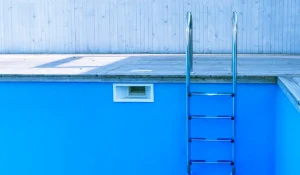Mastering Pool Stain Removal
A sparkling, pristine swimming pool is a sight to behold, offering a refreshing oasis in your backyard. However, unsightly stains on your pool’s floor, steps, or liner can quickly mar the beauty and enjoyment of your pool. In this blog, we’ll explore the causes of stains in a pool, how to prevent them, and the methods to get rid of those stubborn blemishes that occasionally plague pool owners.
Understanding the Causes of Stains in a Pool
Stains can originate from various sources, and understanding the cause is crucial in determining the most effective stain removal method. Here are the common reasons behind pool stains:
- Metals: One of the primary culprits of pool stains is the presence of metals, such as iron and copper, in the pool water. These metals can enter the pool from various sources, including fill water, corroding pool equipment, or metal-based algaecides.
- Organic Materials: Leaves, twigs, and other organic debris can accumulate in your pool and create brown or greenish stains. These stains often develop in areas where debris settles.
- Algae and Bacteria: The growth of algae or bacteria in the pool can result in stains, with different types of algae causing various colors of stains.
- Minerals: High mineral content in the pool water can lead to scaling and staining. Calcium, in particular, can form white, chalky deposits on pool surfaces.
Preventing Stains in Your Pool
- Proper Water Chemistry: Maintaining balanced water chemistry is vital to prevent staining. Regularly test and adjust the pH, alkalinity, and calcium hardness levels to keep the water within recommended parameters.
- Use of Sequestrants: Consider using sequestrants or metal control agents to prevent metals from staining your pool. These chemicals help bind to and prevent the metals from reacting with the pool surfaces.
- Filtration and Skimming: Keep your pool clean by regularly skimming debris from the surface and using an effective filtration system. This will help reduce the accumulation of organic materials that can cause stains.
- Algaecide Treatment: Regularly add algaecides to your pool to prevent the growth of algae, which can lead to different types of stains.
Removing Stains from Your Pool
If your pool is already afflicted by stains, here are some methods to help get rid of them:
- Pool Brushing: Use a pool brush to scrub the stained areas. This can help loosen the stains and make them easier to remove.
- Stain Removal Products: There are various stain removal products available, including stain removers, stain erasers, and stain prevention chemicals. Follow the product instructions carefully for best results.
- Ascorbic Acid Treatment: Ascorbic acid, also known as Vitamin C, can be effective in removing metal stains. It’s essential to follow specific instructions and safety precautions when using this method.
- Professional Pool Service: If you’re unsure about the type of stain or find it challenging to remove, it’s best to consult with professional pool service providers like Silverline Pools. They have the expertise and equipment to identify and treat pool stains effectively.
In conclusion, pool stains are a common issue that can detract from the beauty and clarity of your pool. To prevent and remove stains, it’s essential to understand their causes and take appropriate steps to maintain proper water chemistry, employ preventive measures, and use the right stain removal methods. If you’re struggling with stubborn stains or need assistance with stain removal, don’t hesitate to contact Silverline Pools for expert guidance and support.



